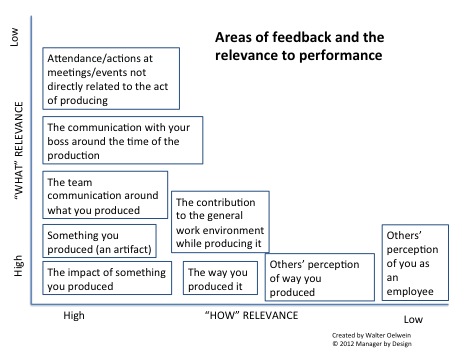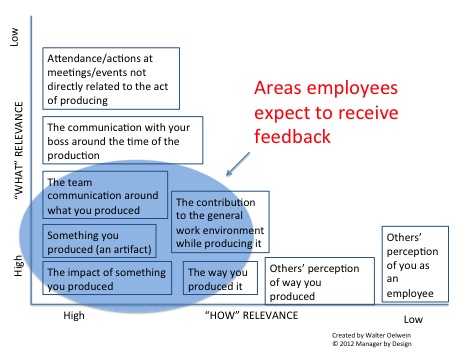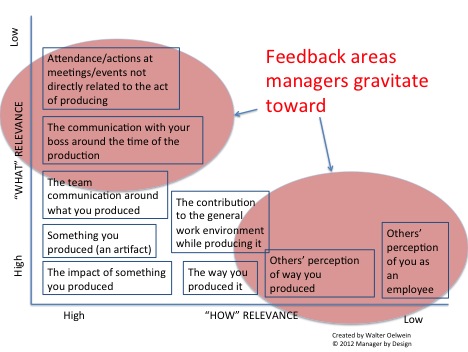A model to determine if performance feedback is relevant to job performance
In my previous article, I discussed a common mistake managers make: They evaluate the “interactions with the boss” performance, and not the “doing your job performance.” So an employee can go through an entire year and not receive performance feedback on the work he was ostensibly hired to do, but receive lots of performance feedback on how he interacts with his boss.
Given this concept of receiving feedback on the job performance vs. receiving feedback on the “in front of the boss” performance, let’s create a model to help managers get closer to the actual performance of an individual, and where the performance feedback needs to be.
Here is a grid that looks at various elements that employees commonly receive “performance feedback” on. I put these elements into boxes along the “what/how” grid, with the most relevant to job performance being toward the lower left, and the least relevant up and to the right.
In looking at this grid, you can see that what is most relevant is the impact of something produced, with the next most relevant elements being the actual thing you produced, and the way you produced it. Finally, the contribution to the general environment and the communication around the thing produced is the next most relevant element. The closer to the lower left, the closer it is it performance.
These boxes are the things that employees actually expect and crave performance feedback on. Employees generally want to hear about the impact of what they produced. If a good impact, so they can keep doing it and even improve upon it. If a bad impact, they want to know so they can make corrections.
So lets add to the image to understand where employees expect and crave receiving performance feedback:
If a manager sits down with an employee to give performance feedback in any of the highlighted areas, the employee will generally agree that it has something to do with performance, and will be more likely listen to the feedback.
Then there’s the reality of many managers/bosses who focus on the less relevant areas of an employee’s “performance”:
Does this remind you of any bosses you’ve had?
The lesson is clear. If you are manager, you should stop talking about the stuff on the “outside” (pink bubbles) and start talking to your employees about the stuff on the “inside” (blue bubble). If a manager starts doing this, the manager will, in turn, be more trusted, more respected, and generate better performance from her employees. And there will be less drama.
So here’s the simple lesson – when giving performance feedback, make sure it’s feedback about performance, and not areas more distance from performance.
Related articles:
Performance feedback must be related to a performance
A second phantom job many employees have: Managing perceptions of others
What inputs should a manager provide performance feedback on?
When to provide performance feedback using direct observation: Practice sessions
When to provide performance feedback using direct observation: On the job
Areas of focus in providing performance feedback based on direct observation: Tangible artifacts
What managers can do about “intangible human-based artifacts”
Three reasons why giving performance feedback based on indirect information doesn’t work
Bonus! Six more reasons why giving performance feedback based on indirect information is risky
Tips for how managers should use indirect sources of information about employees


